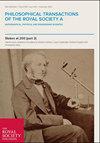Utilization of multi–axial shaking tables for the modal identification of structures
Philosophical Transactions of the Royal Society of London. Series A, Mathematical and Physical Sciences
Pub Date : 2001-09-15
DOI:10.1098/rsta.2001.0872
引用次数: 13
Abstract
A multi–axial shaking table is normally used for earthquake simulation and the dynamic qualification of structures. In most cases the same set–up can also be used for a modal identification of the tested structure. However, this requires the application of suitable modal identification methods. Here, the theory and the basic principles of modal identification by multi–axial base excitation are described. Starting with the relative kinematics and the fundamental dynamic relationships, the specifics of base excitation are explained. Equations for the structural responses and the dynamic forces at the interface are presented and discussed. A survey of identification approaches developed at DLR, Gottingen is given. A frequency– and a time–domain method are described in more detail and illustrated by their application to a laboratory structure. The frequency–domain method is best suited for a general and reliable modal identification, whereas the time–domain method is capable of analysing transient vibrations. Also, the frequency–domain identification of a larger structure is outlined.多轴振动台在结构模态识别中的应用
多轴振动台通常用于地震模拟和结构动力定性。在大多数情况下,同样的设置也可以用于测试结构的模态识别。然而,这需要应用合适的模态识别方法。本文介绍了多轴基激励模态识别的理论和基本原理。从相对运动学和基本动力学关系出发,说明了基激励的具体情况。提出并讨论了结构响应方程和界面处的动力方程。对哥廷根DLR开发的识别方法进行了调查。更详细地描述了频域法和时域法,并举例说明了它们在实验室结构中的应用。频域方法最适合于一般和可靠的模态识别,而时域方法能够分析瞬态振动。此外,还概述了较大结构的频域识别。
本文章由计算机程序翻译,如有差异,请以英文原文为准。
求助全文
约1分钟内获得全文
求助全文
来源期刊
自引率
0.00%
发文量
0

 求助内容:
求助内容: 应助结果提醒方式:
应助结果提醒方式:


